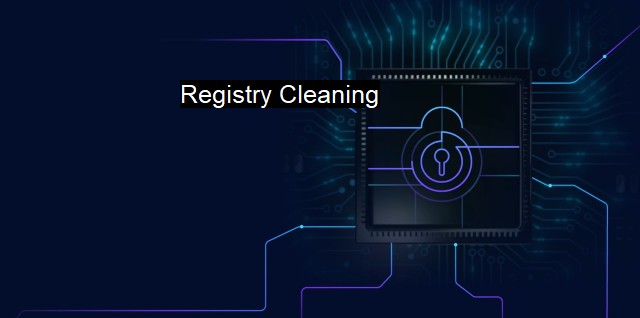What is Registry Cleaning?
Exploring Registry Cleaning: An Essential Component of Cybersecurity and Antivirus Optimization for Peak Performance
Registry cleaning refers to the process of identifying and removing redundant or unnecessary items from the Windows Registry. The Windows Registry, is a core component of the Windows operating system, maintaining a vast database of settings, preferences, and configuration details for hardware, software, and user interfaces. Over time, the registry can become cluttered with invalid or obsolete entries, causing system instability, slow performance, and a number of other issues. Registry cleaning serves to clean this clutter, effectively streamlining the system's operation and, in certain cases, even improving general computing efficiency.Notably, the significance of registry cleaning goes beyond merely ensuring a smoothly functioning computer system. It plays a substantial role as hackers, viruses, and malicious software often exploit outdated or incorrect registry keys to infiltrate systems, compromising the data and functionalities therein. Cleaning a system's registry periodically thereby makes it more difficult for such manipulations to occur.
For instance, when a user unknowingly downloads a virus-file containing a Trojan horse, the malware may establish itself in the Windows Registry in an attempt to initiate harmful processes each time the system starts. This could involve sending sensitive information like passwords or credit card details out to an unknown source. By regularly cleaning the registry, these stale or harmful entries can be identified and removed, effectively minimizing the chance of becoming a cybersecurity victim.
Registry cleaning can also augment the capabilities of antivirus software. Antivirus programs fundamentally work by scanning system components for suspicious activity linked to a certain known malware. not all antivirus software has the ability to scan the Windows Registry as efficiently, leaving certain malware unnoticed. This is where a regularly scheduled registry cleaning operation can step in, working hand in hand with the antivirus software to improve security by purging unnecessary registry entries where malware could hide.
It's quintessential to exercise caution while employing registry cleaners. Automated software are available which claim to clean the registry. While many are legitimate and do assist in effectively cleaning out obsolete or harmful entries, others can be harmful. Some cleaners may incorrectly identify important system entries as errors, removing them and causing the system to malfunction. rogue registry cleaners are not unheard of in the cybersecurity domain - software that masquerades as beneficial, when in fact, they introduce viruses or malware to the system. Therefore, employing reliable software and practices for registry cleaning is important.
One recommended practice is to backup the system prior to running a registry cleaner. Most of the reliable registry cleaners will perform this backup automatically. Revert to this backup should anything go awry during the cleaning process. Also, it's prudent to use registry cleaners sparingly. Over-cleaning can result in a 'too clean' registry, which messes up system configurations and results in a host of other issues.
Registry cleaning is an important system maintenance routine that forms a valuable part of an overall cybersecurity strategy. It aids in computing efficiency by eliminating redundant registry data and bolsters the defense against malicious software infiltration in synergy with antivirus solutions. A cautious, infrequent approach while using trusted registry cleaners, combined with regular system backups, can keep the Windows Registry and the overall system humming smoothly. The bottom-line remains that while not a silver bullet for cybersecurity or system performance matters, registry cleaning can certainly make a valuable contribution to the overall health of a computing system.

Registry Cleaning FAQs
What is registry cleaning and why is it important in cybersecurity and antivirus software?
Registry cleaning is the process of removing unnecessary and invalid entries from the Windows registry database. It is important in cybersecurity and antivirus software because a cluttered or corrupted registry can cause a variety of issues, including system slowdowns, crashes, and security vulnerabilities. By cleaning the registry, cybersecurity and antivirus software can improve system stability and security.Is registry cleaning safe for my computer?
Registry cleaning can be safe for your computer if done correctly. However, it is important to use reputable registry cleaning software and to follow the software's instructions carefully. It is also a good idea to create a system restore point before cleaning the registry, in case any issues arise.How often should I clean my computer's registry?
The frequency of registry cleaning depends on your computer usage and the amount of software installations and uninstallations. In general, it is recommended to clean the registry at least once a month to maintain system performance and security.Can registry cleaning improve my computer's performance?
Yes, registry cleaning can improve your computer's performance by removing unnecessary and invalid entries from the registry database. This can help speed up system response time, reduce application loading times, and prevent system crashes and slowdowns. However, the extent of the performance improvement may vary depending on the computer's hardware and software configuration.| | A | | | B | | | C | | | D | | | E | | | F | | | G | | | H | | | I | | | J | | | K | | | L | | | M | |
| | N | | | O | | | P | | | Q | | | R | | | S | | | T | | | U | | | V | | | W | | | X | | | Y | | | Z | |
| | 1 | | | 2 | | | 3 | | | 4 | | | 7 | | | 8 | | |||||||